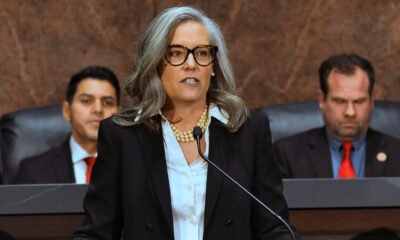Business
Can Abortion Shape the Outcome of the First Post-Roe Presidential Election?

In a poignant display of the complexities surrounding reproductive health, Dr. Kristin Lyerly’s experience during a miscarriage in 2007 highlights the limitations faced by many women in the U.S. At just 17 weeks into her pregnancy with her fourth child, she found herself confronting a grim reality when her placenta detached. Despite her request for a dilation and evacuation (D&E) abortion—a less invasive procedure—her doctor declined, offering only the option to deliver and bury her deceased child. Ultimately, she was able to receive the care she needed, but not without grappling with the implications of reproductive choice in America.
Since the Supreme Court’s decision to overturn federal abortion rights on June 24, 2022, the landscape of reproductive health has drastically shifted, especially in states like Wisconsin. In the wake of this ruling, Lyerly transitioned her practice to Minnesota, joining a lawsuit challenging an archaic Wisconsin feticide law that had been misapplied as an abortion ban. Her journey reflects a broader movement, as many women, motivated by the Dobbs decision, are stepping into the political arena to advocate for reproductive rights.
With the upcoming elections poised to focus heavily on reproductive rights, Wisconsin emerges as a pivotal battleground among the seven swing states influencing presidential elections. “Abortion is top of mind for voters,” noted Ryan Stitzlein of Reproductive Freedom for All, emphasizing its role as a turnout driver. Democratic candidates are leveraging this momentum, including new voices like Lyerly, who is running for Congress in a historically conservative district.
In Arizona, the fallout from the Dobbs decision has reinvigorated debates around an ancient abortion ban that limited procedures to life-saving circumstances. Although some state lawmakers moved to repeal the law, abortion rights advocates are now pushing for a ballot measure to protect access until fetal viability, prompting a significant campaign effort this fall.
Conversely, Georgia is facing renewed scrutiny after the deaths of two women last year highlighted dangerous ramifications stemming from its six-week abortion ban. Both women experienced complications after obtaining medication for early-term abortions, with healthcare providers hesitant to act due to the ambiguous legal landscape. These cases have galvanized activists and re-ignited discussions about the urgency of reproductive health policies.
With a backdrop of varied state policies, Michigan and Nevada have emerged as critical states for abortion rights advocates. Michigan voters recently approved a constitutional amendment to safeguard abortion rights, while Nevada’s legislative measures aim to shield patients and providers from out-of-state repercussions. As electoral races heat up, both states symbolize the ongoing struggle and strategic maneuvers in the battle over reproductive rights.
North Carolina also plays a crucial role, especially with its growing Latinx voting demographic, which may significantly impact the next elections. Local activists, like Iliana Santillan, are actively mobilizing these voters against restrictive abortion laws, emphasizing the importance of reproductive autonomy. As sentiments evolve, so too do the strategies of candidates on both sides of the aisle, particularly in battleground states.
As electoral races unfold, the stakes remain high not just for candidates but for constituents whose rights hang in the balance. A poll indicates considerable support for abortion rights in swing states, prompting candidates to focus on these pressing issues. With Lyerly campaigning to amplify reproductive health narratives and abortion services resuming in Wisconsin, the outcomes of these elections could have far-reaching implications.
In a nation grappling with the fundamentals of reproductive rights, the coming months could redefine the future landscape of healthcare policy and personal autonomy. The voices of advocates, patients, and healthcare providers will continue to resonate, challenging the status quo and seeking to broaden access to essential services.


















